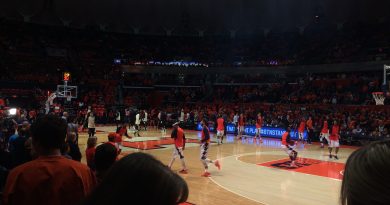The Life of an ROTC Student
Some students love the challenge and time that ROTC requires.
Keegan O’Donnell, a freshman studying Industrial Design who is enrolled in the Army ROTC program, is one of those students who enjoys his time in ROTC.
“I really enjoy doing the stuff with ROTC and it’s not really adding any more homework,” O’Donnell said. “Most of it is just everything we learn through the program.”
The ROTC program here is comprised of Army, Navy and Air Force ROTC. Each program is unique, with different amounts of work required within the program. Students are required to take Military Science courses as electives on top of their normal school work.
“My schedule is often very hectic, but you are still expected to attend or have all the necessary materials [for the program]. Plus, throwing homework into the mix, it can be difficult to make sure you have sufficient time for studying,” Sarah Gattone, a freshman studying Aerospace Engineering who is enrolled in the Navy ROTC program, said.
“NROTC takes up a significant chunk of time for the typical freshman in the program,” Derek Husemann, Midshipman First Class, said. “There are two one hour long sessions of physical training per week and a two-hour leadership laboratory once a week. On top of that, the Navy requires Fourth Class Midshipmen (freshmen) to account for six hours of study hours in our spaces per week.”
Similar to Navy ROTC, Army ROTC can also take up a large amount of a student’s time.
“Typically, [the cadets] will spend eight hours per week with ROTC. That breaks down to two 1-hour classes, three physical fitness sessions of 80 minutes each and one 2-hour lab each week,” Eric L. Ashworth, Assistant Professor of Military Science & Scholarships and Enrollment Officer for Army ROTC said.
Even though ROTC may take a large amount of time in a student’s week, they are still encouraged to join RSOs and other activities.
“Some cadets are Division One athletes. We have crew members for the Rowing Team, Ice Hockey players and a few involved with student government. Fraternities are big as is the Honors Societies,” Husemann said. “Cadets are students first, so involvement outside of ROTC is encouraged to produce a more well-rounded officer once they are commissioned.”
“I’m on the rugby team and it isn’t hard to fit it into my schedule,” Ben O’Donnell, a freshman studying in DGS who is enrolled in the ROTC said. “Only when we go to away games on Saturdays does it take time because you have to drive there, play the game and then come back.”
Though ROTC may be a big time commitment, it can still be an amazing tool for students at Illinois.
“It all comes down to character and your ability to push through when you don’t think you can” Gattone said. “When you do [make it], you’re going to look back and proudly say, ‘I did that’.”
“Make the most fun out of ROTC as you can. If you come in with a negative attitude it will be more difficult, but with the people there it’s easy to adapt and have fun,” Keegan O’Donnell said.
“Be physically fit, keep an open mind and be willing to put yourself out of your comfort zone. Take notes from the beginning and figure out the leader you want to be by getting in the heads of those superior to you,” Husemann said.
ROTC can provide countless opportunities for incoming freshman to get involved with the military. It can be difficult and time consuming, but for many it will be the greatest experience of their lives.



